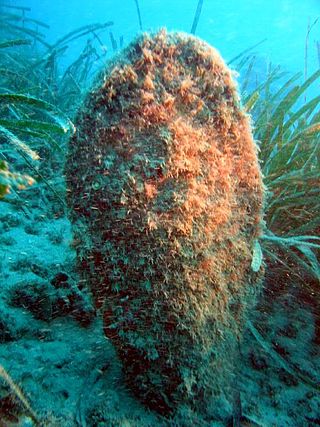Pinna nobilis
Species of bivalve From Wikipedia, the free encyclopedia
Pinna nobilis, known by the common names noble pen shell and fan mussel, is a large species of Mediterranean clam, a marine bivalve mollusc in the family Pinnidae, the pen shells.[2]
| Pinna nobilis | |
|---|---|
 | |
| Live specimen of Pinna nobilis, in Levanto, Liguria (Italy) | |
| Scientific classification | |
| Domain: | Eukaryota |
| Kingdom: | Animalia |
| Phylum: | Mollusca |
| Class: | Bivalvia |
| Order: | Pteriida |
| Superfamily: | Pinnoidea |
| Family: | Pinnidae |
| Genus: | Pinna |
| Species: | P. nobilis |
| Binomial name | |
| Pinna nobilis | |
| Synonyms | |
| |
It reaches up to 120 cm (4 ft) of shell length.[3] It produces a rare manganese-containing porphyrin protein known as pinnaglobin.[4]
Description
Summarize
Perspective


The bivalve shell is usually 30–50 cm (1.0–1.6 ft) long,[5] but can reach 120 cm (4 ft).[3] Its shape differs depending on the region it inhabits. Like all pen shells, it is relatively fragile to pollution and shell damage. It attaches itself to rocks using a strong byssus composed of many silk-like threads which used to be made into cloth. The animal secretes these fibres from its byssus gland; they consist of keratin and other proteins and may be as long as 6 cm (2.4 in). The inside of the shell is lined with brilliant mother-of-pearl.[6]
As with other members of its genus, Pinna nobilis hosts symbiotic crustaceans which live inside its shell; in this case it is the shrimp Pontonia pinnophylax and the pea crab Nepinnotheres pinnotheres.[7] It is believed that when it sees a threat, the shrimp warns the host, perhaps by retracting its claws or even by pinching. The clam then closes shut. It has been demonstrated that the shrimp has a similar filter-feeding diet to its host and the relationship is likely mutualistic.[8]
Distribution
This species is endemic to the Mediterranean Sea, where it lives offshore at depths ranging between 0.5 and 60 m (1.6 and 196.9 ft).[9] It could be found buried beneath soft-sediment areas (fine sand, mud, often anoxic).[10]
Human relevance
This species is the origin of sea silk, which was made from the byssus of the animal.[11]
Threats
Summarize
Perspective
In 2016, an outbreak of one disease caused the mortality of 99% of its population in Spain. The cause of the disease was a newly discovered pathogen, Haplosporidium pinnae, which still poses a serious threat to the survival of the species. By 2019, mortality spots had been detected in Greece, Croatia, Turkey, Tunisia, France and Morocco. In the Trieste area, considerable efforts have also been made to conserve the deposits since 2020.[12][13] In the past, Pinna nobilis faced extinction, due in part to fishing, incidental killing by trawling and anchoring, and the decline in seagrass fields; pollution kills eggs, larvae, and adult mussels.[11] Such threats, however, have been very localised and have not led to such a widespread and rapid population decline. The pathogen, which is still present in the environment, will make recovery a challenge, so continuing declines are expected. The percentage of population size reduction over the last ten years is over 80%. In December 2019, Pinna nobilis has entered the IUCN Red List as critically endangered.[14][15]
The noble pen shell has been listed as an endangered species in the Mediterranean Sea. The European Council Habitats Directive 92/43/EEC, on conservation of natural habitats and the wild fauna and flora, proclaims that P. nobilis is strictly protected (by the Annex IV of EEC, 1992) – all forms of deliberate capture or killing of fan mussel specimens are prohibited by law.[10]
As part of the Costa Concordia disaster recovery effort in Italy in 2012, a group of about 200 Pinna nobilis was relocated to a nearby area due to the threat posed by subsequent engineering work.[16]
The byssus of Atrina pectinata, a shell of the same family, has been used in Sardinia as a substitute for Pinna nobilis, to weave sea silk.[17]
Protection and extinction
Pinna nobilis is sensitive to exceptional pollution. Many die due to anchoring; additionally, illegal extraction, which has been prohibited in Croatia since 1977, is still present. It has been placed on the list of strictly protected species in Croatia. Any extraction of P. nobilis out of the sea is heavily fined.
Gallery
- Live specimen of P. nobilis, looking into the shell from above
- Pinna nobilis: shell and byssus
- The very fine byssus threads of P. nobilis
- Shell of Pinna nobilis
- Releasing male gametes, Pula, Croatia
- Marthasterias glacialis attack, Pula, Croatia
See also
References
Further reading
External links
Wikiwand - on
Seamless Wikipedia browsing. On steroids.









